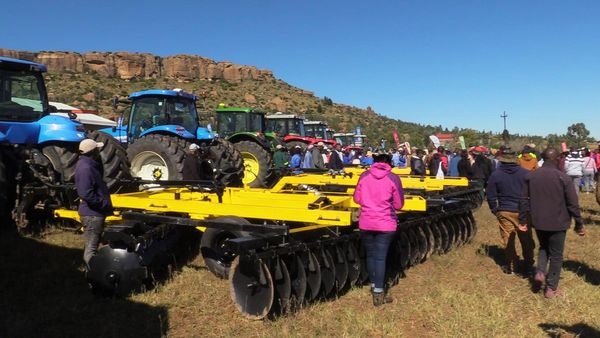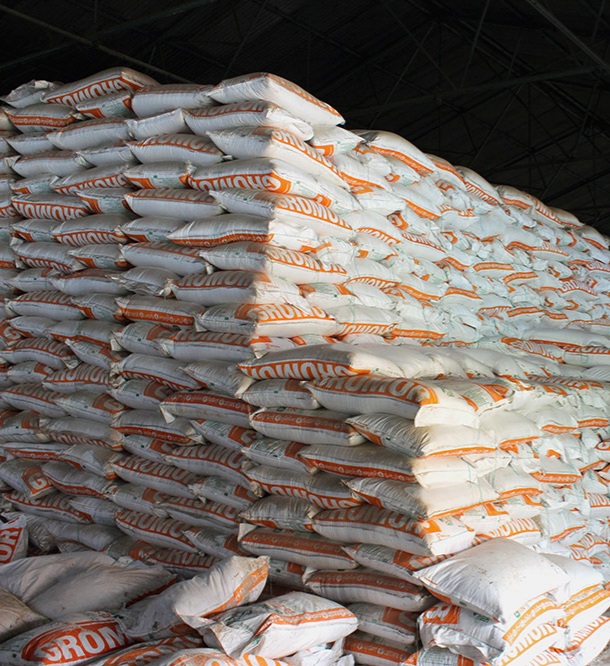Ntsoaki Motaung
The government will pilot a block farming project on a 1564-hectare land in Leribe in partnership with farmers and other stakeholders in an effort to revive the ailing national food production.
This was recently highlighted by Prime Minister Samuel Matekane week during the launch of the winter cropping season at Kolonyama in the Leribe district.
The PM said the past governments have pumped resources into helping individual farmers to improve crop production with no success, thus his government is moving to partner with farmers, agricultural machinery suppliers and operators, the army, the police and commercial banks to pilot a block farming project to produce wheat in Ha Manama, in the Leribe district.
“We are going to demonstrate how agriculture should be handled in order to increase productivity,†Matekane announced last week.
An impressive fleet of different agricultural machinery was also on display as Matekane addressed the gathering.
“This season we are targeting to increase wheat production to three tons per hectare. We are not expecting to harvest anything less than 4694 tons of wheat.â€
Matekane called on farmers to embrace block farming for improved agricultural production.
Lesotho is a known net importer of agricultural products, and according to the Food and Agricultural Organisation (FAO), the country is facing heightened food insecurity in 2023 due to low crop production from the 2022 cropping season.
“…this is a result of the torrential rainfalls in January 2022 that caused crop losses, and low rainfalls towards the end of the cropping season,†FAO indicated
Matekane stressed that block farming has a potential of turning around the country’s agricultural production.
“There is strength in unity.â€
“Block farming is also beneficial in optimising usage of farming machinery such as combine harvesters because they work well on fields that are grouped together, rather when they are scattered around,†he said.
He noted that his government would continue to subsidise agricultural inputs which includes seeds and fertilisers as 70 and 80 per cent respectively.
The Prime Minister said it is through farming that Lesotho will be able to end poverty and grow its economy.
Matekane’s government has proposed a budget allocation of M1.1 billion towards agriculture for the 2023/24 financial year in a clear statement of intend to rouse the country’s ailing crop production.
Finance and Development Planning Minister, Dr Retšelisitsoe Matlanyane, outlined the government’s intentions on agriculture in her budget speech.
“On achieving food security and improving nutrition and promoting sustainable agriculture, farmers will be supported by continuing to increase access to agricultural inputs and provide technical support to increase productivity and output.
“This continued effort will increase grain production of maize from 27,900 tonnes to 438,000 tonnes, wheat from 5,700 tonnes to 48,700 tonnes and beans from 43,000 tonnes to 97, 500 tonnes by 2027.â€
She said the Ministry of Agriculture would continue to promote climate smart agriculture for small- and large-scale farmers using cost effective technologies.
“The government has developed an irrigation master plan that was developed with the support of the World Bank. The plan covers around 53, 000 hectares, with an estimated cost of over US$ 800 million. The focus for the coming fiscal year will be on supporting the rehabilitation of existing infrastructure and to package the initiative to promote local and foreign investment, using different facilities that have been created to access finance.
“Farmers that have capacity to acquire agricultural equipment and machinery will be assisted to access the existing facilities, which includes credit guarantee facility with the Post bank and matching grant schemes mentioned earlier.
“Production of wool and mohair are the main agricultural exports, and it has increased more with the assistance of Wool and Mohair Promotion Project on culling and exchange, and government will continue to support farmers to produce 8000 kg of wool and 1000 kg of mohair in the coming financial year. The agricultural sector is proposed an allocation of M1.1 billion.â€
On his part, the Minister of Agriculture Thabo Mofosi echoed Matekane’s sentiment in his recent address to journalists about winter cropping.
He said this year’s winter cropping is going to be different from how it used to be done before, based on the studies the ministry has conducted.
Mofosi said production is going to be of high quality and quantity from the same soil which was used in the past years.
He said his ministry has started talks with the Lesotho Flour Mills to facilitate storage for Maseru based harvest.
The minister further noted that farmers based in different districts would use the Disaster Management Authority (DMA) storage facilities.
Summary
- The government will pilot a block farming project on a 1564-hectare land in Leribe in partnership with farmers and other stakeholders in an effort to revive the ailing national food production.
- The PM said the past governments have pumped resources into helping individual farmers to improve crop production with no success, thus his government is moving to partner with farmers, agricultural machinery suppliers and operators, the army, the police and commercial banks to pilot a block farming project to produce wheat in Ha Manama, in the Leribe district.
- “Production of wool and mohair are the main agricultural exports, and it has increased more with the assistance of Wool and Mohair Promotion Project on culling and exchange, and government will continue to support farmers to produce 8000 kg of wool and 1000 kg of mohair in the coming financial year.

Your Trusted Source for News and Insights in Lesotho!
At Newsday Media, we are passionate about delivering accurate, timely, and engaging news and multimedia content to our diverse audience. Founded with the vision of revolutionizing the media landscape in Lesotho, we have grown into a leading hybrid media company that blends traditional journalism with innovative digital platforms.







